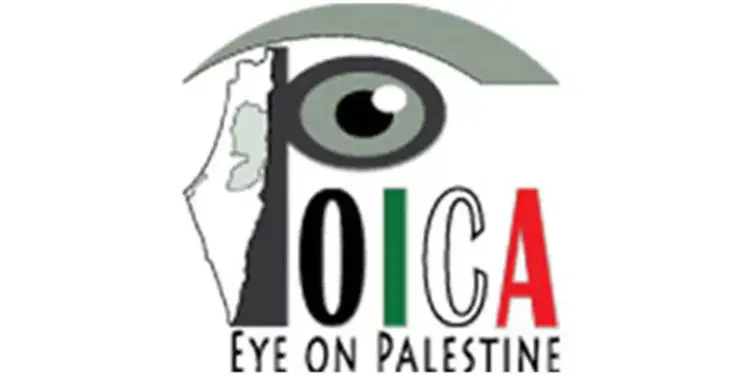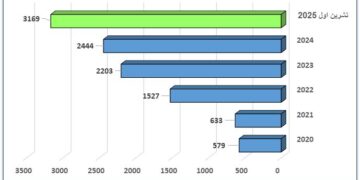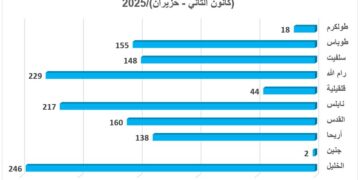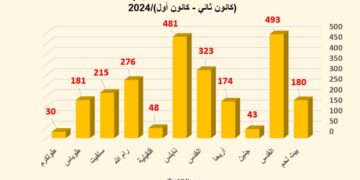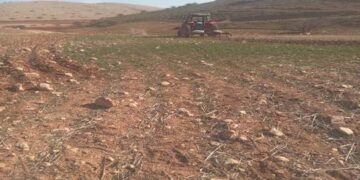In the early morning of October 19, 2010, the Israeli settlers of Betar Illit settlement set fire to Palestinian owned lands near the settlement site, in an area locally known as Wadi Qiddis (Qiddis Valley) in Husan village west of Bethlehem city. The fire devoured 35 dunums of lands planted with Olives, Grapes and Almonds trees. It is worth mentioning that Israeli occupation forces and the settlement security guards of Betar Illit settlement hindered Palestinian fire crews, land owners and citizens from approaching the targeted area to put off the fire, which in turn caused the burning of a large number of fruitful trees which are considered a source of living for many Palestinian families in the village .The affected lands are owned by Shawasha and Hamamra families in the village. Table No. 1 gives details of the damages caused by the fire in Husan village. See Photos
|
Table 1: The fruitful trees destroyed by fire in Husan village west of Bethlehem city
|
|
No.
|
Type of trees
|
Number of burned trees
|
|
1
|
Olive trees
|
180
|
|
2
|
Grapes
|
200
|
|
3
|
Almonds
|
200-250
|
|
Source: Husan Village council –Bethlehem
|
Photos 1-3: Part of the damage caused by Israeli settlers of Betar Illit Settlement
to the Palestinian Agricultural lands located next to the settlement.
During a field visit to the affected area, ARIJ field team met with Mr. Jamal Shawasha whose land lies next to the settlement. Mr. Shawasha noted that ‘no day passes without clashes with the Israeli settlers and their continuous attacks against lands, crops, and fruitful trees’. Mr. Shawasha added that ‘settlers invent methods to tighten the grip on Palestinian farmers to prevent them from reaching their lands and sometimes they throw stones at farmers to force them leave the lands’. He also said that ‘when they report to the Israeli army residing in the nearby military camp, their complaint is being ignored and transferred to the settlement security guards, who in turn try to induce Palestinian land owners to drive them out of their lands, rather than stopping Israeli settlers attacks and violations’.
Another Palestinian farmer who was present at the affected site added that ‘there are three parties who try to destroy agricultural crops and displace Palestinian farmers from their lands in order to annex it to the settlement. The three parties are: (1) the settlement security guard who keep ignoring Palestinians’ complaints against Israeli settlers’ attacks (2) the Israeli occupation army and the laws it imposes on Palestinian Land owners whose lands are located in the vicinity of the settlement in an attempt to prevent access to the area and (3) the Israeli settlers and their continuous attacks against Palestinian lands and properties.’ It is worth mentioning that the Israeli occupation army issued lately a military order which prevents Palestinian farmers from entering their lands before 9 am in order to obstruct the Olive Harvest season in the village.
Betar Illit Settlement, location & Population:-
The settlement of Betar Illit is located west of Bethlehem city and was built on lands confiscated from 3 Palestinian villages in the western rural area of Bethlehem Governorate, Husan, Nahhalin and Wadi Fukin. Today, the settlement occupies a total land area of 4686 dunum and houses 36,400 Israeli settlers. (See table.1)
|
Table 1: Palestinian villages effected by the establishment of Betar Illit settlement in 1985, Bethlehem governorate
|
|
Village Name
|
Village area (Dunum)
|
Area occupied by settlement from Palestinian village (Dunum)
|
Percentage
|
|
Husan
|
7295
|
3430
|
47%
|
|
Nahhalin
|
17250
|
688
|
4%
|
|
Wadi Fukin
|
4347
|
567
|
13%
|
|
Total
|
|
4685
|
|
Source: GIS Unit-ARIJ 2010
Map 1: The affected area in Husan Village
Betar Illit settlement, a major environmental threat to the village of Husan
Husan village suffers from the environmental pollution caused by Israeli settlersliving in Betar Illit settlement who release sewage on Palestinian lands which causes damage and poisoning of the crops, fouling of water sources and a public health hazard for the Palestinian cland owners in Husan village. Abu Muhammad, a Palestinian farmer who owns a piece of land in the area states that ‘Israeli settlers of Betar Illit settlement open sewage channels towards Palestinian lands in the village of Husan every two weeks with the aim to destroy the agricultural crops and fruit trees’. The wastewater sewage plant of Betar Illit settlement is located on a hill overlooking Husan agricultural lands and the neighboring Palestinian villages. He adds that ‘before crops harvest season, Israeli settlers sneak through an opening in the fence that separates the settlements from the Palestinian lands and destroy the crops and plants.‘

Photo 4: The sewegae channel which Israeli setters use to release wastewater to Palestinian Agricultural lands
Photo 5: The Sewega Plant of Betar Illit Settlement
The continuation of settlement construction in Betar Illit settlement
Palestinian land owners in Husan Village stated that construction in the settlement of Betar Illit didn’t stop even during the settlement construction freeze moratorium which was announced about by the Israeli Prime Minister Binyamin Netanyahu on November 25, 2009 for ten months. On the contrary, new buildings and housing units were added to the settlement in addition to laying the infrastructure for the addition of more new housing units in the settlement.

Photo 6: Two under-construction buildings in Betar Illit settlement
To conclude
With the beginning of the olive Harvest season in occupied Palestinian territory, Israeli settlers increased their attacks against Palestinian lands and trees which made it much more difficult for most Palestinian families to harvest their olives. These systematic Israeli settlers’ attacks not only target the Palestinian people but also the very roots of Palestinian existence on the lands they have cultivated for generations. For example, settlers commonly steal olives from Palestinian groves before the owners are able to harvest the trees. The theft of olives is rarely, if ever, stopped by Israeli occupying forces that often intervene on behalf of the settlers.
Prepared by


